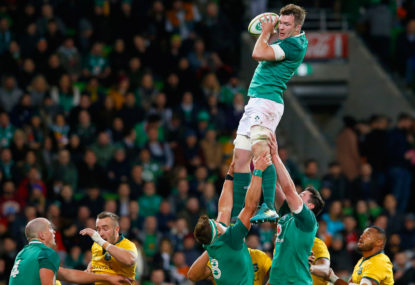In the end Australia’s June Test series played out how most pundits thought it might.
A 2-1 result, with Ireland, the world number two ranked side, Six Nations champion, playing away from home, at the tail end of a long, arduous season, just edging an improving but still ‘rough around the edges’ Wallabies outfit, the series outcome still in the balance right up to the final play.
It was a thrilling finish to a decider that might have lacked in pure quality but more than compensated in old-school combativeness, the two sides engaged in a running battle to impose their own styles on the match.
Ireland won because they controlled the match for longer periods, notably the ten minutes when Jacob Stockdale was sin-binned for elbowing Nick Phipps in the throat, where they retained an astonishing 84 per cent of possession.
The first half was a triumph of Irish defence springing quickly off their line in numbers and bottling up the midfield as they had done in Melbourne, regularly pinning the Wallabies runners behind the advantage line.
Later the Wallabies began to punch their way through courtesy of the energy provided by Taniela Tupou, Tolu Latu and a resurgent Lukhan Tui, but it proved too little too late. One try to Marika Koroibete from an intelligent Bernard Foley grubber was enough to give them the opportunity to win, but a second series-winning try proved just beyond them.
Ireland coach Joe Schmidt indicated afterwards that his side would struggle to come up again had there been another match next week. There’s not of course, and it was a credit to his selection and player management that he timed his run perfectly so that fatigue – predicted by many, including me – to be a factor in the series, never determined the result.
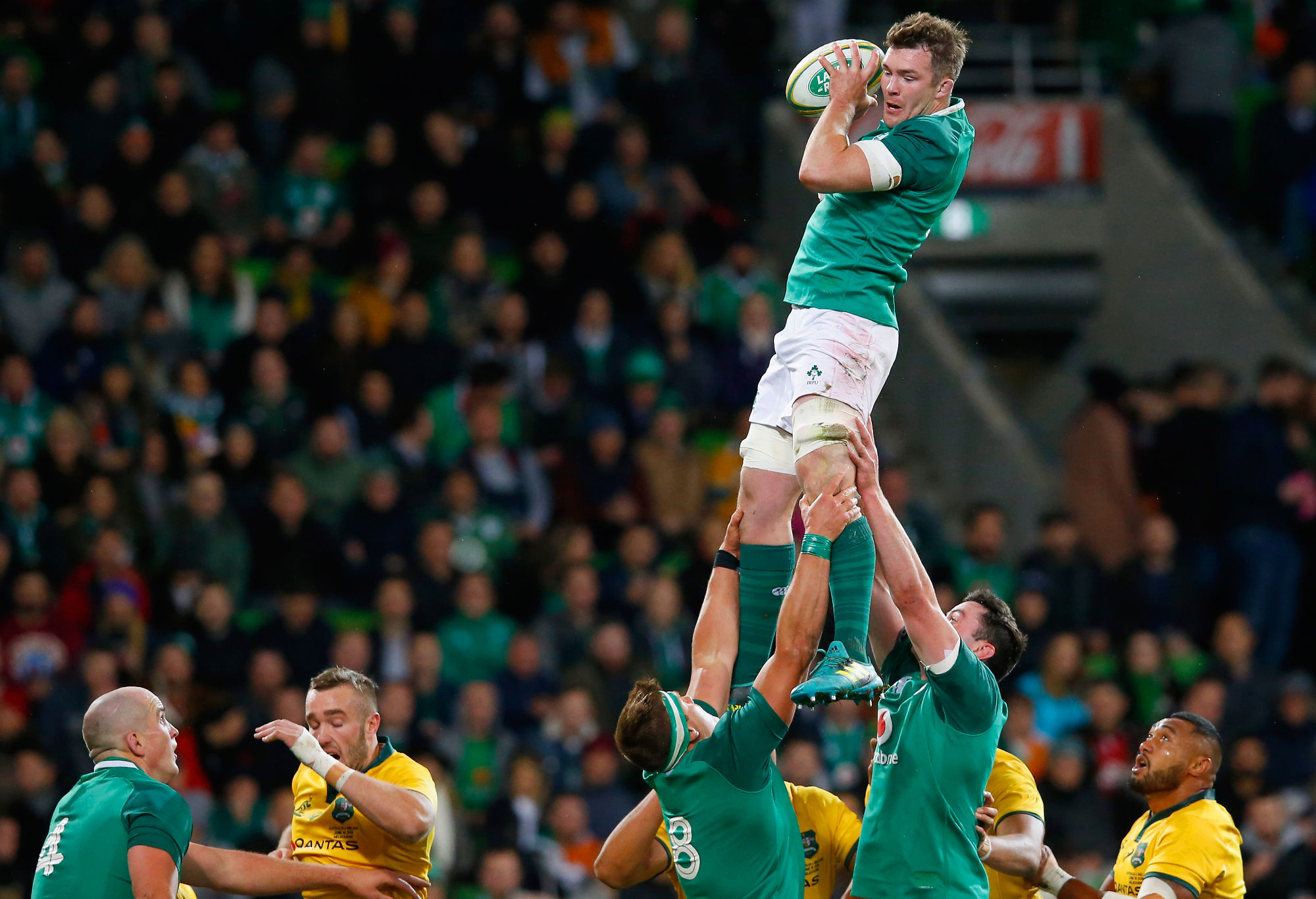
(Darrian Traynor/Getty Images)
If one of the reasons for New Zealand’s dominance at the top of the world rankings is their much-vaunted player depth, it is also a reason why Ireland has cemented itself at number two – case in point hookers Niall Scannell and Rob Herring, who entered the tour ranked third and fourth in the position and who were again among Ireland’s best.
If the argument that Ireland lacks the individual flair and talent of their hosts is true – and Connor Murray, Jonathan Sexton and Jordan Larmour lead a strong case against – what is undeniable is that Ireland has greater depth of test-ready players across all positions than Australia.
This is a testament to Schmidt and also to the strong campaigns mounted by Leinster and Munster in particular, whose performances in Europe and the Pro 14 compared to the Australian franchises in Super Rugby hold their players in better readiness for when they make the step up to test rugby.
That gap is beginning to narrow and will likely narrow further. It was a point noted by a bitterly disappointed Michael Cheika immediately after the match when, despite frustration with the loss, he correctly reminded viewers of where his team was 12 months ago, unimpressively muddling around against Scotland and Italy.
For that improvement to continue the too regular lapses in discipline – a needless late shot on Sexton by Sekope Kepu, a clumsy challenge on Murray by Pete Samu, and others – must be washed out of the Wallabies game. Samu Kerevi too was penalised, offside Ken Owens-style at a botched kick-off, allowing Sexton to immediately cancel out a Foley penalty and Ireland to take a 12-9 lead into half-time.
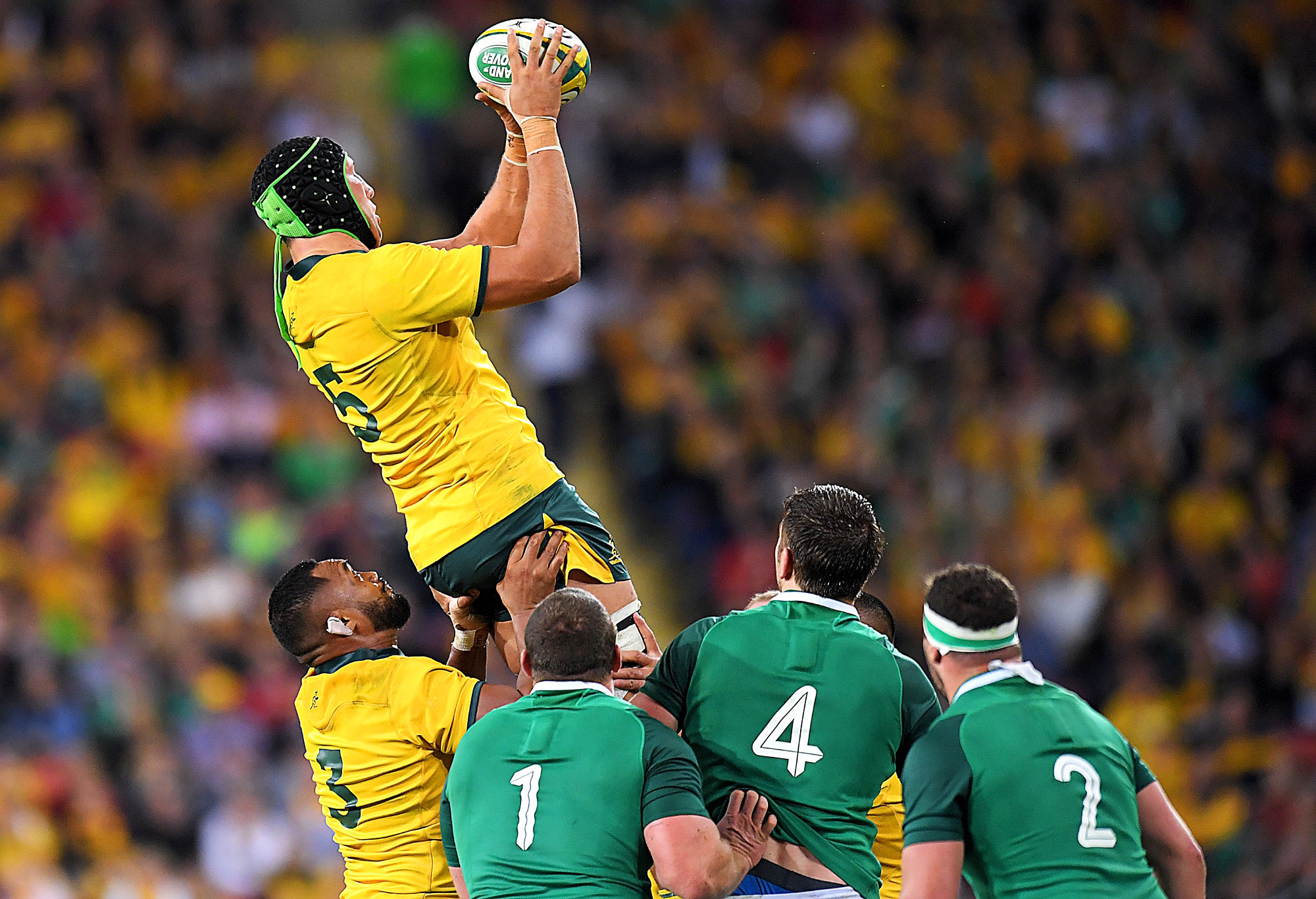
(Albert Perez/Getty Images)
Another of Australia’s pressing problems also caught up with them, and the quest to develop better depth in the halves must surely be given the highest priority.
Although harshly treated by a ruling on a flat pass, the role of replacement halfback Joe Powell was to spark the attack, to find a higher gear that the tiring Irish couldn’t match, not to leave the ball sitting at the base of a couple of rucks while he ambled, not sprinted across, too late into his position.
Given recent angst over matters of officiating it was almost inevitable that the match would end with television match official Ben Skeen and referee Pascal Gauzere deep in discussion over potential intentional pass interference by Stockdale.
Fans bayed for a Wallabies penalty and some commentators, like Jamie Pandaram from the Daily Telegraph, were enraged that the game “descended into farce as the TMO judged there was not sufficient evidence to overrule the on-field decision, despite replays showing Stockdale clearly played at the ball”.
Of course ‘playing at the ball’ and ‘playing the ball’ are not the same thing, and if the alternative take, “the match ended in anti-climax when Foley inaccurately threw a pass over the sideline” doesn’t make for a captivating headline or satisfy the outrage mentality that drives too many commentators and fans, so be it.
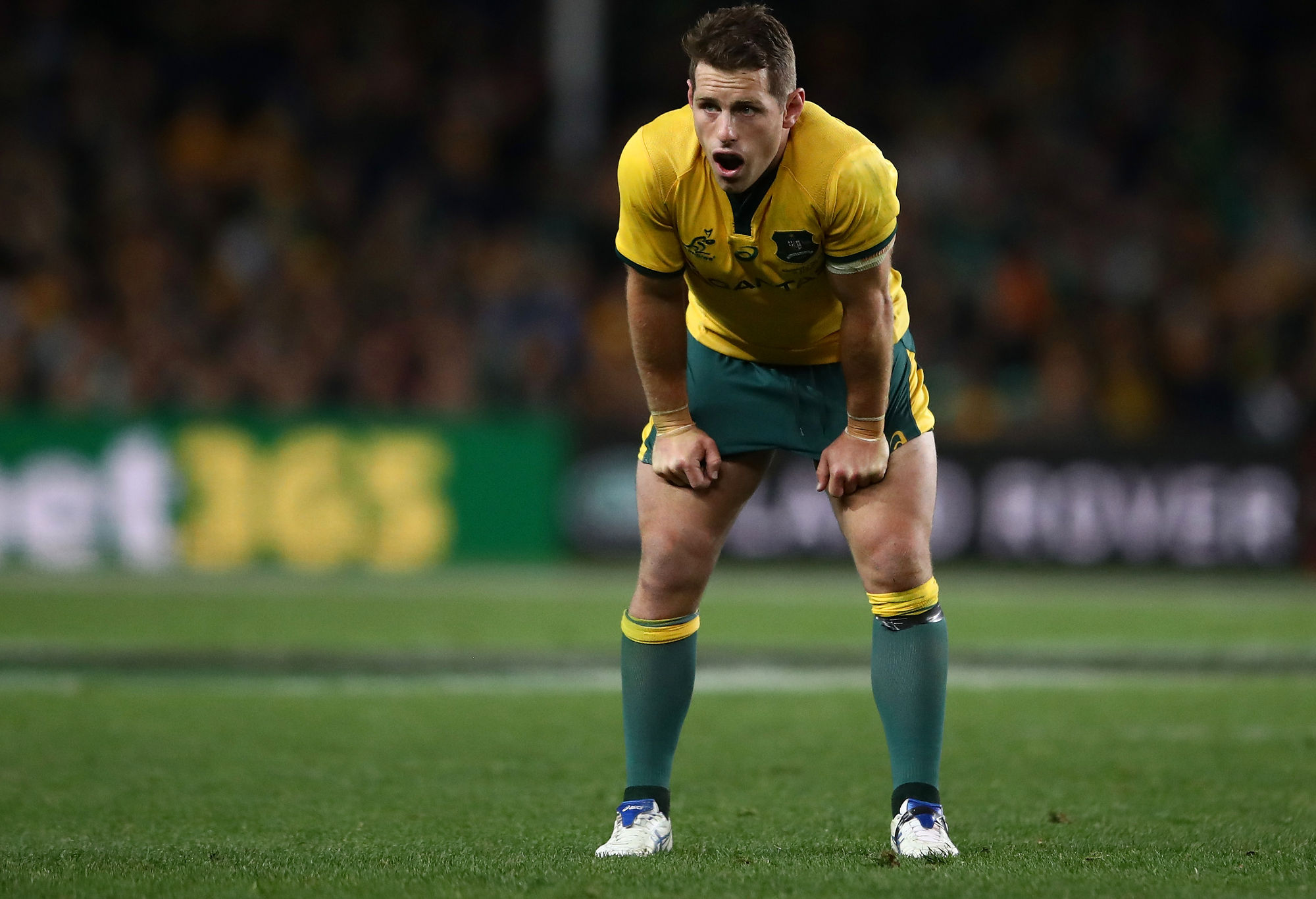
(Cameron Spencer/Getty Images)
There are any number of places for a referee to stand on a rugby pitch and Irishman John Lacey just happened to choose the wrong one at the wrong time for Baptiste Serin as Damien McKenzie raced in for one of the All Blacks’ seven tries in their 49-14 defeat of France in Dunedin.
Given last week’s shenanigans, do not be surprised if there is an announcement from World Rugby on the way, rescinding the try and amending the score to 42-14. Not that this would concern Steve Hansen, who was delighted that his team was able to refocus and deliver a far more accurate and disciplined performance.
Despite once again failing to get the rub of the green, France were physical and combative, their backline was sharper for the exclusion of Matthieu Bastareaud and replacement halfback Serin again showed his ability to ask tough questions of the defence.
But there is no better sight in rugby than when the All Blacks lift the tempo and the passes stick, and the pace of players like McKenzie, Aaron Smith, the absent Beauden Barrett and the dazzling Rieko Ioane comes to the fore.
McKenzie enjoyed his best match at flyhalf. It was by no means error-free because – that’s not his nature – but he kicked impressively and his running and distribution notably improved as his confidence levels rose. This was largely down to his forward pack playing more assertively and providing a far more consistent platform that they did last week.
Scott Barrett’s test debut came in the loss to Ireland in Chicago in 2016, where he impressed with his athleticism and ball-handling ability. Given the opportunity to start at lock in this series due to the enforced absence of Brodie Retallick, Barrett has, two years on, taken his game to a new level, standing out here for his defensive work rate and a one-on-one strip which set up Ioane’s second try.
Also noteworthy in that try was a silky pass under pressure by promising centre Jack Goodhue, playing his role in a combination of McKenzie, Sonny-Bill Williams and himself that might have been expected to take a lot longer to gel than it did.
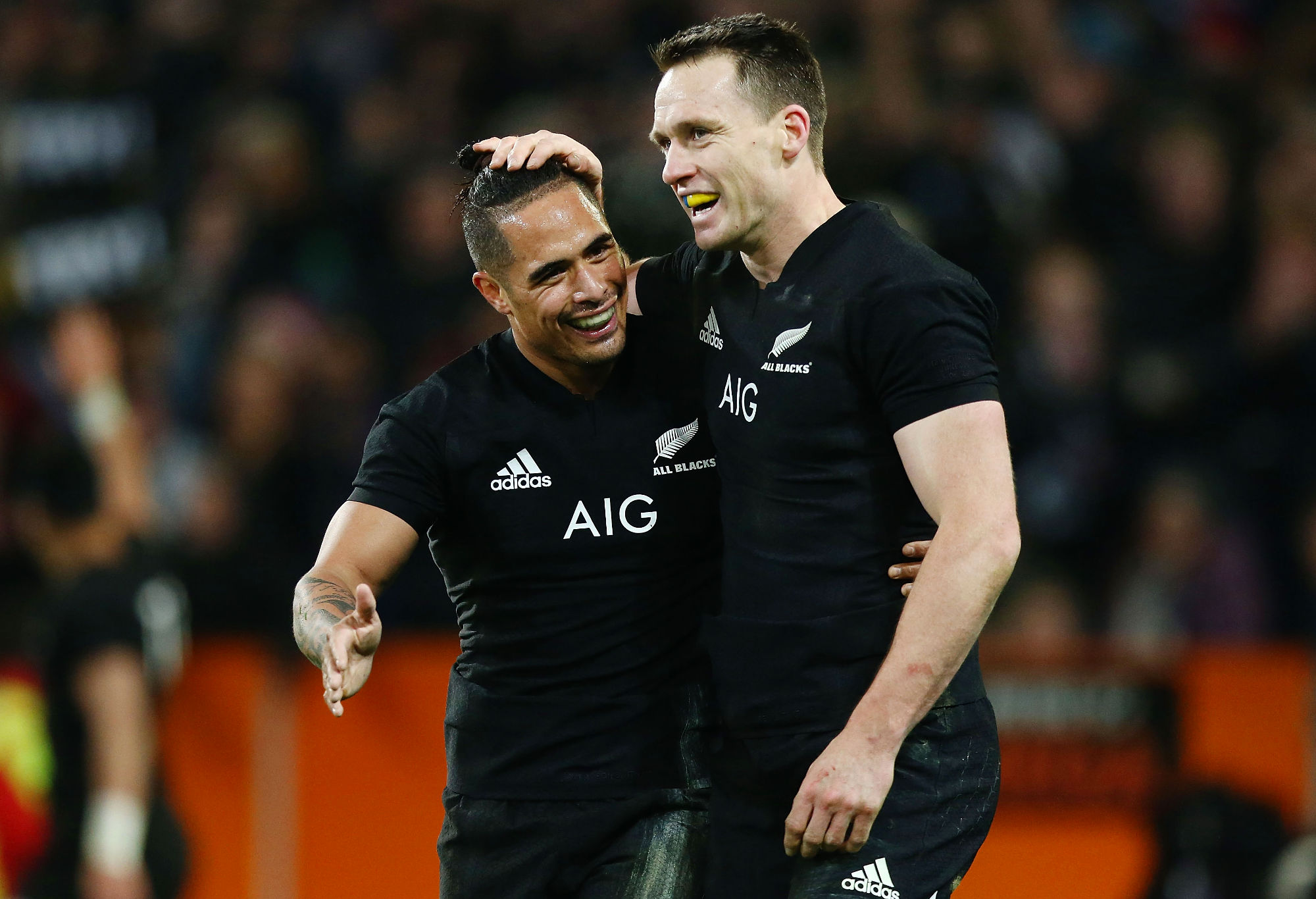
(Anthony Au-Yeung/Getty Images)
While England fought back well and fully deserved their 25-10 win in Cape Town, claims by Eddie Jones that England are “reaching a peak” feel premature and suggest that Jones has mistaken Everest for Ben Nevis.
Back to sea level on the Newlands slop, an arm-wrestle match provided a tempo more to the liking of the England pack, improved by the addition of Joe Launchbury. That the handling of the English – back and forward – was far superior to that of South Africa was telling, as was their improved accuracy at the breakdown.
Much was made of the reintroduction of flyhalf Danny Cipriani after a ten-year absence from Test duty. For the most part he was tidy, if somewhat anonymous, until the 70th minute, when he superbly stopped a cross-kick on a dime in the in-goal area, allowing a flying Jonny May to force for the clinching score.
South Africa will be disappointed at their step backwards, but progress is rarely perfectly linear. A number of youngsters have been blooded, and a 2-1 series result in their favour is fair reward for Rassie Erasmus and his side.
Hopes that Argentina would put their coaching dramas behind them against Scotland were answered in the negative, the Scots cruising to a six-try, 44-15 win in Resistencia.
The win caps off an excellent year for the Scots and an abject June for Argentina, who it seems have the personnel to play well either as Pumas or as Jaguares but not as both. An opportunity exists for an entrepreneurial mirror manufacturer to supply the Pumas with a room full of them before the start of the rugby championships.

(Lynne Cameron/Getty Images)
To finish this week on the two important matters of referee bashing and offence to common decency. Many were quick to blame CJ Stander for a ‘loose carry’ in his lift of captain Peter O’Mahoney in the incident that led to Israel Folau’s yellow card. I wonder how many of those people have lifted and held 100 kilograms above them, had that weight bumped and twisted while it was above them, and managed to hold on.
Referee Gauzere has nothing to answer for. Folau competed fairly for the ball, but it was his left-handed wrap around O’Mahoney’s torso that caused him to twist and fall awkwardly. Notably, Folau has subsequently been warned and summoned to a judiciary hearing for a similar incident that occurred in the ninth minute.
Folau leaping for the ball and catching it high above him is a great sight in the game, but if in order to help check his own momentum he upends his opponent, then he is accountable for that and will need to perfect his technique.
Gauzere also came under intense criticism for a late breakdown penalty against Latu. It was a split-second thing, Latu in position to effect a steal, but vision from front-on – the view that Gauzere had – shows Latu resting his weight on his left wrist/forearm as he burrows under for the ball with his other arm. It also shows Gauzere warning Latu to stop competing.
[latest_videos_strip category=”rugby” name=”Rugby”]
Nowadays we wake to headlines shouting about television match official controversies and referee incompetence when really what is occurring is what has always occurred: largely competent referees making occasional mistakes or, in Latu’s case, ruling a tight 50/50 call one way or the other.
It may be asking for the impossible, but in addition to providing entertainment and colour, rugby’s TV commentators have a responsibility to inform viewers of this truth instead of playing the outraged victim.
Technology provides certainty and accuracy in many aspects, but this is offset by its inconsistent application, invasion into the running time of what should be a continuous contest, and the false premise that all decisions can be absolute. Most certainly technology shouldn’t be a tool for commentators to reinforce pre-existing biases and ignorance of the laws, and the sooner the offenders realise that they are driving an unhealthy subtext in the way rugby is watched and discussed and change their behaviour, the better off the game will be.
As for the other important ‘cease and desist’ matter? For those readers who haven’t yet seen images from Greg Norman’s nude calendar shoot, please resist at any cost. Once viewed it can never be unseen.





























































































